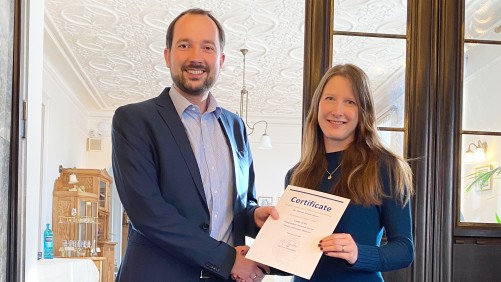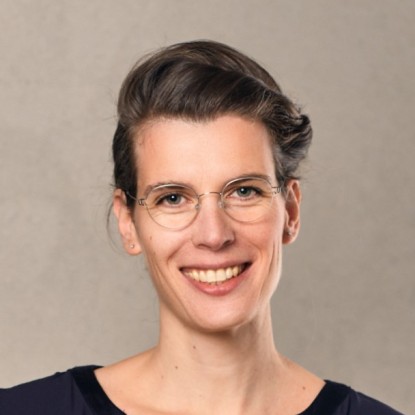New Emmy Noether Group researches explainable artificial intelligence for image and video analysis
Dr. Simone Schaub-Meyer aims to extend XAI to dense visual tasks
2024/03/04 by ag
The German Research Foundation has accepted Dr. Simone Schaub-Meyer into its Emmy Noether Program. With her new junior research group, she wants to research and develop methods that increase the understanding of widely used artificial intelligence (AI) models in image and video analysis and improve their robustness. The funding for the first three years amounts to around 1.1 million euros and includes funds for two doctoral positions and 8 high-quality graphics processors.

New methods in artificial intelligence, especially deep learning, have also led to major advances in computer vision. Computer vision enables object recognition in driver assistance systems, for example, or the detection of diseased tissue in medical images. For such safety-critical and legally relevant applications, it is particularly important that the processes and models are trustworthy. Typically, the performance of a method is measured and compared on defined training data sets. But what happens when rare scenarios or scenarios that differ from the training data occur? In most cases, the behavior of the AI is difficult or impossible to understand and predictions are hardly possible.
Dr. Simone Schaub-Meyer's research in Explanable Artificial Intelligence (XAI) aims to change this. She studies the behavior and decision-making processes of artificial neural networks in order to draw conclusions about their robustness and generalizability. Her focus is on dense visual tasks. These tasks involve classifying each pixel in an image as, for example, “car,” “street,” “sidewalk,” or "person. In semantic segmentation, the algorithms not only recognize whether there is a car in the image, but also where it is.
Extending XAI to dense vision tasks is an essential and necessary step to increase the understanding and robustness of widely used models in image and video analysis.
In her project XIVA – eXplainable Image and Video Analysis, funded by the Emmy Noether Programme, Schaub-Meyer will apply the methods of XAI specifically to image and video analysis. Her goal is to develop interpretable explanation methods for spatial and spatio-temporal visual tasks such as image/video segmentation and motion estimation. The insights gained from this work will be used to improve the models themselves and their robustness.
To this end, she will first analyze the predictive performance of existing models that already provide novel, human-interpretable metrics. A direct comparison will reveal global weaknesses and strengths of the models. Another goal is to develop local attribution methods that can process and visualize spatial and spatio-temporal decision processes.
Schaub-Meyer deliberately focuses on the development of self-interpreting models for dense prediction tasks. In a final step, the scientist will evaluate the developed approaches with suitable, novel data sets and reference values in order to evaluate explainability and robustness.
The Emmy Noether Programme allows me to develop and expand my group. Therefore, I am looking for two more PhD students to start this summer. I am excited to tackle these challenging but important research questions with my group in the inspiring environment of TU Darmstadt and the Hessian Center for Artificial Intelligence.
Dr. Simone Schaub-Meyer
About Dr. Simone Schaub-Meyer
Simone Schaub-Meyer is an independent research group leader at the Technical University of Darmstadt and a member of the Hessian Center for Artificial Intelligence – hessian.AI. There, she also heads a DEPTH research group funded by the HMWK as part of the cluster project The Third Wave of Artificial Intelligence (3AI). Her research focuses on the development of efficient, robust and comprehensible methods and algorithms for image and video analysis. Before founding her own group, she was a postdoctoral researcher in Prof. Stefan Roth's Visual Inference Lab. Before that, she worked as a postdoc in the field of Augmented Reality at the Media Technology Lab of ETH Zurich. Her doctorate “Video Frame Interpolation and Editing with Implicit Motion Estimation” was carried out in collaboration with Disney Research Zurich under the supervision of Prof. Dr. Markus Gross at ETH Zurich. In her dissertation, which was awarded the ETH Medal, she developed novel methods for motion estimation and video frame interpolation.
Emmy Noether Program
The German Research Foundation (DFG) offers the Emmy Noether Program to highly qualified young researchers to prepare for a professorship. The program involves leading an independent research group at a university or research institution, as well as associated teaching tasks, which allows participants to develop and showcase the necessary skills for a professorship. To be eligible, applicants must have a doctorate with exceptional results and high-ranking publications.


![Das von Schaub-Meyer et al. [1] mitentwickelte Framework FunnyBirds kann zur Evaluierung von Explainable AI-Methoden verwendet werden. Durch das Entfernen einzelner Vogelteile und die Messung der Leistungsveränderung konnten die Wissenschaftler*innen die Bedeutung der einzelnen Teile für die Grundwahrheit annähern. In diesem Beispiel ist der Schnabel wichtiger als die Füße.
[1] Robin Hesse, Simone Schaub-Meyer, Stefan Roth. FunnyBirds: A Synthetic Vision Dataset for Evaluating Explainable AI Methods. International Conference on Computer Vision (ICCV), 2023.](/media/informatik/fb20_allgemeines/fb20_news/2024/2024_03_funnyBirdFramework_405x0.png)
![Das von Schaub-Meyer et al. [1] mitentwickelte Framework FunnyBirds kann zur Evaluierung von Explainable AI-Methoden verwendet werden. Durch das Entfernen einzelner Vogelteile und die Messung der Leistungsveränderung konnten die Wissenschaftler*innen die Bedeutung der einzelnen Teile für die Grundwahrheit annähern. In diesem Beispiel ist der Schnabel wichtiger als die Füße.
[1] Robin Hesse, Simone Schaub-Meyer, Stefan Roth. FunnyBirds: A Synthetic Vision Dataset for Evaluating Explainable AI Methods. International Conference on Computer Vision (ICCV), 2023.](/media/informatik/fb20_allgemeines/fb20_news/2024/2024_03_funnyBirdFramework_475x0.png)


